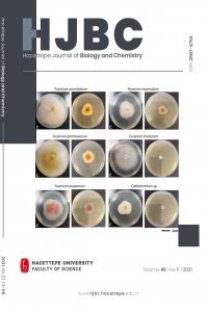Chemical composition and antibacterial activities of propolis collected from different regions of Turkey
Chemical composition and antibacterial activities of propolis collected from different regions of Turkey
The aim of the present work is to study the chemical composition and antibacterial activities of Turkish propolis collected different regions of Turkey such as Adapazarı, Burdur, Bursa, Kemaliye-Erzincan, Ordu and Trabzon provinces. Ethanol extracts of propolis (EEP) were prepared for chemical analysis. Gas chromatography coupled with mass spectrometry (GC-MS) was used for the chemical analysis in the organic compound base. Escherichia coli, Salmonella typhi, Proteus sp., Staphylococcus aureus, Bacillus subtilis and Beta Hemolytic Streptococcus bacteria were used to determine the antibacterial activity of propolis samples. All propolis samples have different chemical composition, however antibacterial activities of the propolis samples showed similar antibacterial properties. It was observed that all propolis samples affected to the growth of the gram positive bacteria. The activity against gram negative bacteria was weak.
___
- 1.Sorkun K., Süer B., Salih B. Determination of chemical composition of Turkish propolis. Z. Naturforsch. 56c,666-668, 2001. 2.Szente L., Szejtli J. Formulation of propolis with $breta$ -cyclodextrin. Acta Pharm. Technol., 33 (4) 218-221,1987.
- 3.Deweerd B. Learning about propolis. Bee Informed, Vol, 5, No, 2. 1979.
- 4.Grange J. M. and Davey R. W. Antibacterial properties of propolis. J. Roy. Soc. of Med., 83, 159-160,1990.
- 5. Arkan O., Sorkun K., Dogan C. and Güler P. Mycelial form of Morchella conica Pers. on the nutrition with pollen and propolis. APIACTA, XXX 11-4,112-118, 1997.
- 6.Khayyal M. T., El-Ghazaly M. A. and El-Khatip A. S. Mechanisms involved in the anti-imflammatory effect of propolis extract. Drugs Under Experimental & Clinical Research, 19, 197-203,1993.
- 7.Gallo F. R. and Savi G. Propolis: Its use in technology and research. Bollettino Chimico Farma-Ceutico, 134, 483-491,1995.
- 8.D'Albore G.R. L'origine geographique de la propolis. Apidologie, 10 (3), 241-267, 1979.
- 9.Papay V., Soltesz M., Csizmadia B. and Toth L. Chemical and pharmacological study of propolis samples from various locations. Acta Pharm. Hungarica, 57,143-151,1987.
- 10.Koo R, Rosalen P. L. Cury J. A., Park Y.K. Bowen W.H: Effects of compounds found in propolis on Streptococcus mutans growth and on glucosyltransferase activity, Antimicrobial Agents and Chemotherapy, 46, 1302-1309, 2002.
- 11.Popova M., Bankova V., Tsvetkova I., Naydenski C, Silva M. V. ,The first glycosides isolated from propolis diterpene rhamnosides. Zeitschrift Fur Naturforshung C, J Biosciences, 12, 1108-1111,2001.
- 12.Velikova M., Bankova V., Sorkun K., Haucine S., Tsvetkova I. and Kujumgiev A. Propolis from Mediterranean Region: Chemical Composition and Antimicrobial Activity. Zeitschrift Fur Naturforshung C, J Biosciences, 55, 1-4, 2000,.
- 13.Santos F. A., Bastos E. M. A., Uzeda M., Carvalho M. A. R., Farias L. M., Moreira E.S.A., Braga F.C. Antibacterial activity of Brazilian propolis and fractions against oral anaerobic bacteria. J.Ethnopharmacology, 80, 1-7,2002. 14.Nieva M. I., Isla M. I.,Cudmani N. G., Vattuone M. A., Sampietro A. R. Screening of antibacterial activity of Amaicha del Valle (Tucuman,Argentina)propolis. J.Ethnopharmacology,68,97-l 02,1999.
- 15.Hady A.E., Faten K., Hegazi A. G. Egyptian prop.olis:2, Chemical composition, antiviral and antimicrobial activities of East Nile Delta propolis. Zeitschrift Fur Naturforshung C, J Biosciences, 57, 386-394,2002.
- 16.Hegazi A. G. Hady A.E, Faten K. Egyptian propolis:3. Antioxidant,antimicrobial activities and chemical composition of propolis from reclaimed lands. Zeitschrift Fur Naturforshung C, J Biosciences, 57, 395-402, 2002.
- 17.Sforcin J. M., Fernandes A. Jr., Lopes C. A., Bankova y., Funari S. R. Seasonal effect on Brazilian propolis antibacterial activity. J.Ethnopharmacology, 73, 243-249, 2000.
- 18.Scheller S., Dworniczak S., Waldemar-Klimmek K., Rajca M., Tomczyk A., Shani J. Synergism between ethanolic extract of propolis (EEP)and anti-tuberculosis drugs on growth of Mycobacteria. Zeitschrift Fur Naturforshung C, J Biosciences, 54, 549-553,1999.
- 19.Banskota A. H., Tezuka Y., Adnyana I. K., Ishii., E., Midorikawa K., Matsushige K., Kadota S. Hepatoprotective and ant-Helicobacter pylori activities of constituents from Brazilian propolis. Phytomedicine: International Journal of Phytotherapy and Phytopharmacology, 8, 16-23, 2001.
- 20.Koo H., Gomes B.P., Rosalen P.L., Ambrosano G.M., Park Y.K. Cury J.A. In vitro antimicrobial activity of propolis and Arnica montana against oral pathogens. Archives of Oral Biology, 45, 141-148,2000.
- 21.Bankova V., Christov R., Popov S., Marcucci M.C., Tsvetkova I., Kujumgiev A. Antibacterial activity of essential oils from Brazilian propolis. Fitoterapia, 70, 190-193, 1999
- 22.Marcucci,M. C. Propolisxhemical composition,Biological properties and therapeutical activity. Apidologie, 26 83-99, 1995.
- 23.Kujumgiev A.,Tsvetkova I.,Serkedjieva Y., Bankova V., Christov R., Popov S.Antibacterial, antifungal and antiviral activity of propolis of different geographic origin. J.Ethnopharm, 64, 235-240, 1999.
- ISSN: 2687-475X
- Yayın Aralığı: Yılda 4 Sayı
- Başlangıç: 1972
- Yayıncı: Hacettepe Üniversitesi, Fen Fakültesi
Sayıdaki Diğer Makaleler
Selim S. ÇAĞLAR, Sinan KAYNAŞ, Fatih Mehmet ŞİMŞEK
The culture of bacillus spp. from comb foundation
Pollen morphology of some Delphinium L. (Ranunculaceae) taxa in Turkey
Selim Süalp ÇAĞLAR, İsmail K. SAĞLAM
Winter diet of a long-eared owl population in Ankara Beytepe
Effects of salinity and temperature on germination of Kalidiopsis wagenitzii aellen (CHenopodiaceae)
Nilüfer CİHANGİR, Kadriye SORKUN, Bekir SALİH
Placental structure in the rats: Histological and immunohistochemical studies
Evrim Arzu KOÇKAYA, Mehmet Turan AKAY
